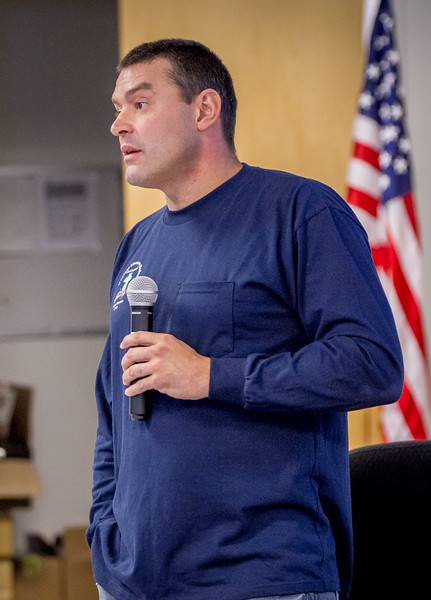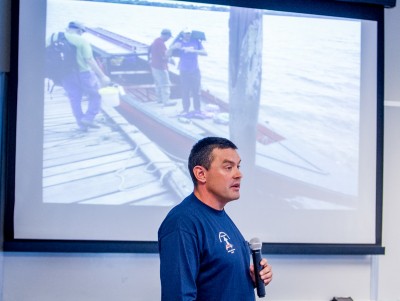Article by Rebecca Band
Photos by John Storey
Climbing equipment. Health and safety laws. Apprenticeship training programs. These are just a few of the reasons why IBEW linemen no longer have the 50% fatality rate they had 100 years ago, and as a result, we have one of the most stable and secure electrical systems in the world.
Even though we all benefit from these advancements, some American linemen take these things for granted. But not Brady Hansen. The IBEW Local 77 member from Idaho recently travelled to South America to help train a group of linemen in the third-world country of Suriname, and what he saw when he got there shocked him to his core and made him realize just how lucky he is to be a lineman in the United States.
The Surinamese linemen he met were covered in scars, both physical and emotional, and on-the-job deaths are incredibly common. They barely earn enough money to live on, and they had no safety mechanisms in place to protect themselves from the everyday hazards of electrical linework. Hansen confessed that he wept for hours after seeing the scars these men carry with them.
“They’re so far behind because they haven’t had the same sustainable, ever-building and ever-growing force we call the IBEW,” Hansen said as he recounted his experience in Suriname to the IBEW 1245 Advisory Council. “When our union started a century ago, we were where they are now, with lots of accidents and fatalities. I’m one of world’s best linemen not because of who I am, but because IBEW made me this way.”
IBEW 1245 Business Manager Tom Dalzell invited Hansen to speak to the Advisory Council after seeing him give an inspirational presentation in Las Vegas. “I see the work that he is doing as critically important,” Dalzell said. “I hope that by having our staff and Advisory Council hear him speak, we might see our members step forward and help with Brady’s project and start a similar project.”
Hansen, an instructor at the Spokane Lineman School, made the decision to travel to Suriname after a group of electrical engineers from the tiny South American country came to visit his classroom. As he demonstrated a simple safety technique on front of the Surinamese visitors, he registered the shocked looks on their faces and realized just how much he could help to improve the entire electrical industry of a foreign country, simply by providing the type of training that’s considered standard in the United States.
So he gathered up a few of his fellow linemen and some used climbing equipment and booked a flight to Suriname. When he arrived, he knew right away this would be an unusual experience. Right off the bat, the Surinamese linemen were blown away at the fact that Hansen and his colleagues would be willing to donate their time and supplies and expect nothing in return.
“When they found out we came not to take anything but to give to them, they were amazed. People have been coming to take from them for far too long,” Hansen explained, noting the country’s long history of corruption, foreign invaders, slavery and indentured servitude.
Hansen and his team immediately got to work, providing the same type of instruction they give first-year apprentices – teaching them simple skills like knots and rigging, along with theoretical lessons on the way electricity works.
“We introduced them to lineman climbing tools, belts and hooks – equipment they had never seen before. They had been using 30-foot ladders because they were told their wood was too hard to climb,” Hansen said, underscoring his story with a photo slideshow that depicted the dangerous and antiquated way the Surinamese linemen performed their work.
“Hungry to Learn”
Hansen said that as soon as the lessons began, the Surinamese linemen crowded around him, pulled out their smartphones and started recording videos and snapping photos. They deluged him with question after question, trying to get as much out of the lesson as they possibly could.
“I’ve never been in a room of people who want to learn so desperately,” Hansen remarked to the Advisory Council. “Sessions that were supposed to be two hours long were still going after 2 hours and 45 minutes. If you didn’t walk out of the room you couldn’t end the session. They were that hungry to learn.”
The men didn’t have much, but they utilized whatever was at hand. They drew diagrams in dirt and tied knots on each other’s arms and legs. They only had a few harnesses, so they all waited patiently and took turns learning to climb the American way.
Hansen also taught them some of the standard words and phrases that trained linemen use to ensure their safety and protect their crew members. When he introduced them to the term “Hold the Pull,” he dimmed the lights and showed them the video on YouTube that the IBEW 1245 Hold the Pull committee put together.
“That was the first time they’d seen a lot of equipment we take for granted, the first time they’d even seen linemen on YouTube like that,” Hansen said, noting that while the Surinamese love YouTube, they use different words to describe what linemen do, making it nearly impossible for them to find videos of American lineworkers online. “At the end of the video, the lights came back on and the room was full of tears. It was at that point that we connected in an amazing way. They realized what we were about, that we were there to make a difference. I’ve never been moved like that.”
Hansen also had the opportunity to see the Surinamese linemen at work. He went out with a small crew that maintains the power lines in the dense, wet rainforest. The challenges they face in their unique environment are unlike anything Hansen had seen in the U.S. Many of the utility poles are simply tree trunks stripped of branches and bark, and the humidity is so intense that plants actually grow out of the power lines.
“The only equipment they have is a boat and a four-wheeler, and they maintain miles and miles of feeder along a river,” Hansen said. “They have to drag a 30-foot ladder around through the jungle; it’s no wonder so many of them have back problems.” Hansen emphasized that helping these linemen work better and safer doesn’t just benefit the men doing the work – it has the capacity to help lift up the entire country. When lineworkers toil in hazardous conditions for paltry pay, they simply cannot do their best work, and that makes the electrical system unreliable. He shared the gut-wrenching story of 90 contractors who were brought in from India to build a transmission line.
“When one guy fell to his death, someone from the company came by, tossed his lifeless body in the back of the pickup and took him away. No one ever saw him again,” Hansen said. “They were all so scared of dying when they installed that transmission tower, so the bolts were loose, missing and faulty. When we climbed up there, we had to really watch our back.”
“Birth of a JATC”
Hansen and his team managed to convince the employers that keeping their workers alive and healthy is good for business. “Investing in worker safety means a quality product and more reliable electricity,” he told them – and they listened. The employers quickly formed a coalition and brought Hansen in to help them develop a first-of-its-kind training program and practice facility.
“It felt like we were watching the birth of a JATC, and we were the experts in the room. It was amazing,” he recounted.
Now, the Surinamese have a rudimentary training facility to learn and practice, and thanks to Hansen’s “Recycling for Linemen” program, they have some climbing belts, harnesses and hooks donated by American linemen who no longer need or can use them. He also gave them PPE shirts from his IBEW brothers, which they wear every single day.
Hansen is back in the U.S. now after two trips to Suriname, but his work is far from finished. He stays connected to his Surinamese brothers through social media, and uses Facebook and YouTube to provide things like CPR training to them even when he’s not in the country.
Hansen hopes to take another team to Suriname in next 6-8 months, and says he will continue to take linemen down there until the Surinamese linemen are on par with US linemen. After that, he’ll take his mission to another third-world nation.
To learn more and join an upcoming trip to Suriname, visit the Suriname American Brotherhood Initiative on Facebook or email brady.hansen@avistacorp.com.
A group of linemen from Suriname made the video below for Brady Hansen as a way to say thank you.
//youtu.be/x4JSLHNQD1g

